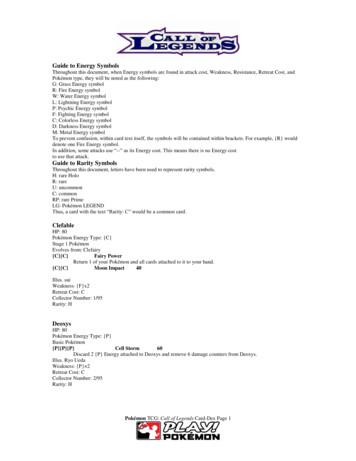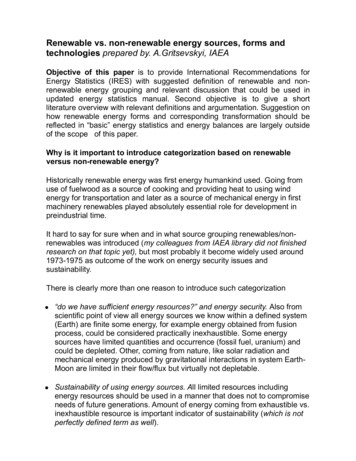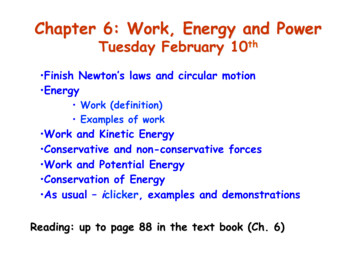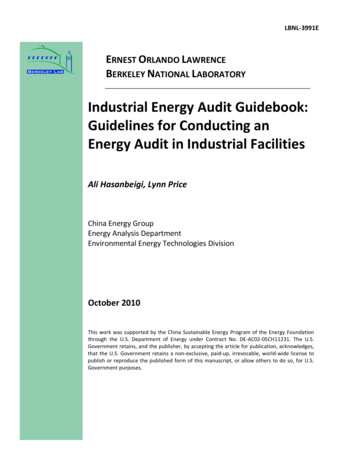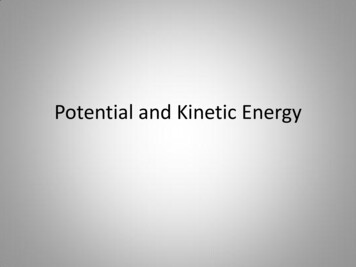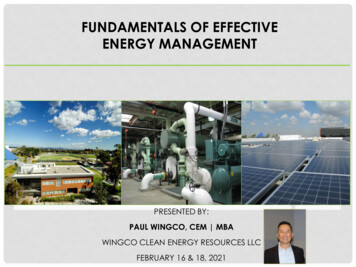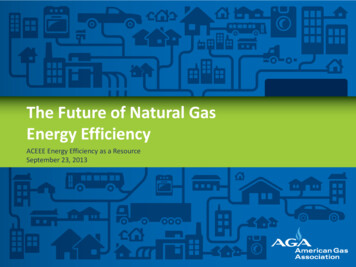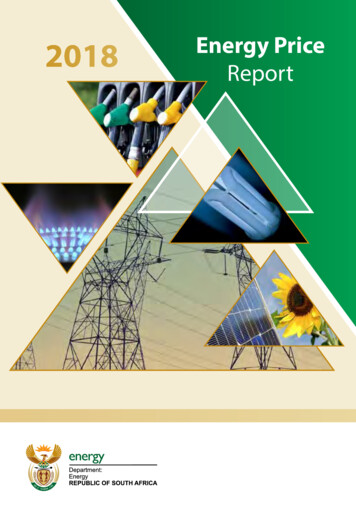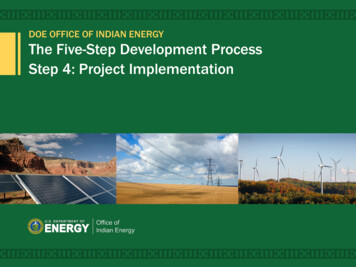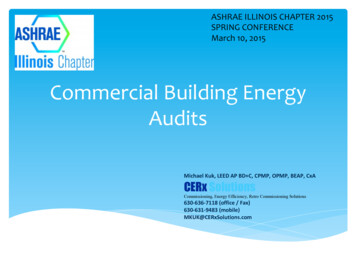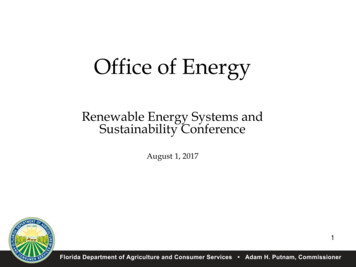
Transcription
Office of EnergyRenewable Energy Systems andSustainability ConferenceAugust 1, 20171
Functions & Responsibilities Legislatively designated state energy policy development officewithin Florida Evaluate energy related studies, analyses, and stakeholder input Promote and advocate for the development and use of renewableenergy resources and energy efficiency technologies Use available state and federal funds to develop and manage energyefficiency, renewable energy, and energy education programs Produce an Annual Energy Report Serve as the State clearinghouse for all energy information2
Florida Building Commission In May 2016, the Office of Energy was appointed to the FloridaBuilding Commission by Governor Rick Scott, per Section 553.74(1)(x),Florida Statutes. The Florida Building Commission:– Modifies the existing Florida Building Code every three years throughrulemaking workshops.– Incorporates any legislative changes when needed, through rulemakingworkshops.– Reviews requests for Accessibility Waivers across the state.– Develops Declaratory Statements to clarify questions regarding codes.– Approves products and applications for building code trainers andcourses.3
Areas of Focus Renewable Energy Transportation Energy Efficiency Educationand What’s ahead4
Renewable Energy Florida Renewable Efficiency Demonstration (FRED) Renewable Energy and Energy Efficiency Technologies (REET) Bioenergy Demonstration Grant Florida Alliance for Accelerating Solar and Storage TechnologyReadiness (FAASSTeR)5
Farm Renewable and EfficiencyDemonstrations (FRED) Promotes the adoption of technologies and practices that increaseenergy efficiency and renewable energy use in Florida agriculture. 1 million from U.S. Department of Agriculture, Natural ResourcesConservation Service 2 million from Farm to Fuel Provides Florida farmers with energy evaluations and helps themimplement the recommendations with up to 25,000 for eligibleprojects including energy efficient lighting and water pumps, fuelefficient tractors and generators, and small scale renewable energygeneration such as solar or biomass. To date, the FRED program has received 11 applications.6
Renewable Energy and EnergyEfficient Technologies (REET) The REET Grant Program is a competitive grant program designed toprovide funding for projects to conduct demonstration,commercialization, research, and development projects relating torenewable energy technologies and innovative technologies thatsignificantly increase energy efficiency for vehicles and commercialbuildings. The Notice of Funding Availability closed in November of 2016.Currently, there are five grants conducting research utilizing REETgrant funds.7
Renewable Energy and EnergyEfficient Technologies (REET) University of Central Florida – “Unlocking the High Efficiency Potential ofBifacial Silicon Solar Cells by Advanced but Simplified Techniques” – GrantFunds 400,000Florida Agricultural and Mechanical University - “Enhancing sustainableproduction of algal biofuels using electromagnetic field energy” – Grant Funds 399,038Florida Institute of Technology – “Demonstration of a Cost-Effective, ScalableZero-Energy Commercial Building Design for Florida Climates” – Grant Funds 282,008Florida Atlantic University – “Demonstrating Technology Enhancements toAchieve Economic Competitiveness of Gulf Stream Electricity Production” –Grant Funds 400,000University of Florida – “Self-running buildings: An autonomous system forreducing energy consumption and increasing demand flexibility of commercialbuildings in hot-humid climates” – Grant Funds 400,000.8
Bioenergy Demonstration Grants Provided bioenergy grants for research, development, andcommercialization relating to bioenergy technologies and innovativetechnologies that significantly reduce fossil fuel consumption fortransportation and/or electric generation. Projects optimized cultivation of certain biofuel feedstocks forproduction in Florida. Researchers explored the suitability and potential of algae, pineterpenes, oilseed crops such as carinata, sweet potatoes, and sugarbeets for drop-in biofuels and processing into ethanol and jet fuel. One project utilized a pilot scale biorefinery in northern Florida to testvarious cellulosic feedstocks for ethanol production. Six grantees were awarded a total of 3.9 million. Project work on all ofthese grants has been completed as of 2016.9
Florida Alliance for Accelerating Solar and StorageTechnology Readiness (FAASSTeR) The Florida Municipal Electric Association (FMEA), Nhu Energy and theOffice of Energy have been awarded a 1.75 million grant through the U.S.Department of Energy SunShot Initiative to bring more solar plus storage toFlorida. The goals of this three-year project include conducting detailed solar energystudies and analysis, and developing strategies that will expand solar, energystorage, and other distributed energy resources. Project participants include the National Renewable Energy Laboratory,Lawrence Berkeley National Laboratory, City of Tallahassee electric utility,Gainesville Regional Utilities (GRU), JEA (Jacksonville), Lakeland Electric,Orlando Utilities Commission (OUC) and Florida Municipal Power Agency(FMPA), and the Southern Alliance for Clean Energy.10
Transportation Initiative for Resiliency in Energy through Vehicles (iREV) Drive Electric Orlando Biofuels Infrastructure Partnership (BIP)11
iREV Collaborated with the National Association of State Energy Officialsand national stakeholders to develop iREV. iREV is a national effort to catalyze state and local acceptance anddeployment of alternative fuel vehicles and infrastructure inpreparing for and responding to manmade and natural disastersand emergency situations. Focuses on alternative fuels such as biodiesel (B100), propane,natural gas, and electricity. iREV will educate, coordinate, and provide the emergencymanagement community with data, tools, and resources they needto make optimal fleet investment decisions in their jurisdictions.For more information: www.naseo.org/irev12
Using a 400,000 award from the U.S. DOE Clean Citiesto work with the Electrification Coalition and the CentralFlorida Clean Cities Coalition promote Drive Electric Orlando. Drive Electric Orlando offers:– An option to rent an electric vehicle in Orlando, Florida.– Incentives for renting an electric vehicles including:– VIP treatment at Epcot’s Test Track ride– free valet parking,– preferred parking spots,– ample charging stations,– free three-month membership to CLEARLane Access whichallows travelers to skip the identification check point at theairport and head straight to the physical screening13
Drive Electric Orlando Program partners include: Since the program launched in October 2015:– 1,672 electric vehicle rentals with over 373,000 miles driven.– Trained over 250 rental car company employees to help ensurerenters have a seamless and superior rental experience.14
Biofuels InfrastructurePartnership (BIP) Received a 16 million, Biofuels Infrastructure Partnership awardfrom the U.S. Department of Agriculture. Goal is to increase the availability of infrastructure capable ofdispensing higher blends of biofuels. Retrofits under this program began in May 2016. From May throughApril 2017, there have been 155 blender pumps and two dedicatedE85 pumps installed at a total of 35 fuel station locations in Florida. Post-installation data collection and reporting will continue forapproximately five years after retrofit work is completed.15
Energy Efficiency Farm Energy and Water Efficiency Realization (FEWER) Multifamily Demonstration Projects16
Farm Energy & Water EfficiencyRealization (FEWER) Program Pilot program in Suwannee County provides on-site energy andwater audits to farms. FEWER also provides farmers with a 75% cost share (up to 25,000)to implement the recommendations. Eligible measures include upgrades to center pivots, diesel pumps,upgrades from a diesel pump to an electric pump, solar pumps,lights, and cooling equipment. The program opened on June 25,2015. Since the program launched on June 25, 2015 through May 31, 2017: 233 applications received 193 audits complete 133 cost share approvals17 2,439,344.00 paid to farmers
Multifamily EnergyDemonstration Projects Based on the recommendations in the Florida Multifamily Energy EfficiencyOpportunities Study. FDACS OOE partnered with two housing authorities to implement energyrelated shallow retrofits - West Palm Beach HA and Pinellas County HA. 320 units were retrofitted: 84 units at Robinson Village in West Palm Beach,and 236 units at Crystal Lakes Manor in Pinellas Park. Retrofits included R-38 ceiling insulation, air duct insulation, 18 SEER airconditioning units, energy efficient lighting, and energy efficient hot waterheaters. Energy data was collected for 12 months prior to and following installations. Initial data analysis shows daily kilowatt hour usage decreased 8% in PinellasCounty and 25% in West Palm Beach. Analysis continues.18
Education Projects Energy Clearinghouse of Information Energy Education Kits for Public Schools19
Florida Energy da-Energy-Clearinghouse Continues to host, update, and expand the Florida EnergyClearinghouse in accordance with Section 570.0741, Florida Statutes. Designed to be a consumer-friendly portal to compare energysaving technologies and learn more about energy usage, energyproduction, renewable energy technologies, and research beingconducted in Florida. My Florida Home Energy is a major component of the FloridaEnergy Clearinghouse.– Takes users on an interactive home tour and offers tips for how they canimprove its energy efficiency.– Uses information provided by the homeowner and publicly accessible datato provide a customized report which identifies energy efficient products,services, and potential energy and monetary savings.– Even includes all available financial incentives in the area.20
Energy Education Kitsfor Public Schools Provided K-12 public schools with 244 energy education kits. Designed to:– Develop teamwork and problem-solving abilities,– Investigate environmental issues, and– Gain hands-on science, technology, engineering andmathematics (STEM) skills. Kits include materials such as solar panels and electric motorswhich provide opportunities for hands on STEM education. An estimated 79,400 children will have the opportunity to learnfrom these kits.21
What’s Ahead Continue to seek Federal funding for energy efficiency programscritical for Florida and local governments Continue to administer current programs and develop new programs Work with the Legislature and Governor’s office to collectivelyadvance Florida’s energy policy Work with the Florida Energy Systems Consortium to expand energyresearch at Florida’s universities22
Contact Information:Kelley Smith BurkKelley.SmithBurk@FreshFromFlorida.com(850) 617-747023
Researchers explored the suitability and potential of algae, pine terpenes, oilseed crops such as carinata, sweet potatoes, and sugar beets for drop -in biofuels and processing into ethanol and jet fuel. One project utilized a pilot scale biorefinery in northern Florida to test various cellulosic feedstocks for ethanol production.
